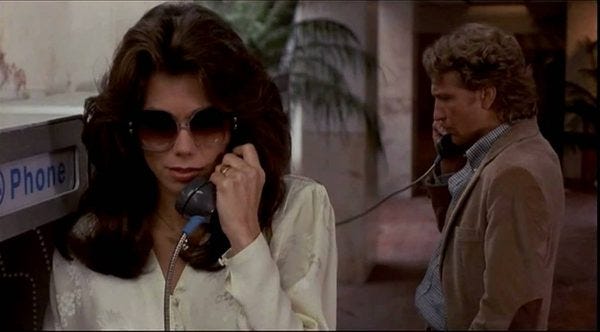Body Double Gazes At Failure
Brian DePalma's brilliantly frustrating voyeurism.
Brian De Palma's debt to Hitchcock is widely acknowledged, but Body Double made me wonder if we shouldn't also acknowledge his debt to Laura Mulvey. Mulvey's gaze theory (famously built most directly on Hitchcock's films) argues that Hollywood cinema melds the gaze of the (male) viewer with the gaze of the (male) protagonist. Men are active lookers; their gaze drives the plot, and generally that plot is driven towards the female object. The viewer, with (say) Cary Grant, picks up the camera, masters the narrative, climbs Mt. Rushmore, and wins the girl. Film makes the male viewer into a hero.
De Palma takes that insight and—riffing on movies like Rear Window and Vertigo—completely inverts it. Body Double's title signals the mirroring of identification, but it's an identification with mastery gone completely awry.
Jake Scully (Craig Wasson), is a two-bit actor whose claustrophobia loses him a job as a vampire mere hours before he goes home and discovers his girlfriend (Barbara Crampton) is cheating on him. The house was hers, and he has no place to stay until Sam (Gregg Henry), a friend of a friend, offers him a luxurious apartment-sitting gig. The pad comes with a rotating bed, a stocked bar, and a telescope, through which, Sam says, Jake can watch their neighbor perform an erotic dance and masturbate in front of the window every night.
Jake, like the viewer, spends his time gazing. But the gaze is the opposite of empowering. Jake (like the male viewer) can't actually touch the object of his desire; he's a pitiful voyeur. Worse, through the telescope he notices another man watching the neighbor, Gloria (Deborah Shelton). Jake's worried that this other man will harm her, and he starts to follow her during the day.
There's a long, bravura scene where Jake trails Gloria through a mall. The camera movements are so lyrical they're dream-like, and Jake also seems to be in a dream, always falling behind, always just a little too late to stop the mysterious stalker. When the man steals Gloria's purse, Jake chases him into a tunnel (hello Freud) where his claustrophobia kicks in and he freezes impotently. Gloria has to help him out; the two (improbably) share a passionate kiss, and then she runs into the tunnel, where he can't follow. The next night, he inevitably, obsessively watches her again, and this time sees the same man assault her with a drill (there's Freud again). He shouts, "He's right behind you!" for all the world like a slasher fan yelling at the screen in a drive-in. He runs to her apartment just in time to see her murdered in front of him. Once again, he looks on helplessly.
The plot takes a number of other turns from there, with Scully getting more adept at moving the action along—he gets his best insight while watching an ad for a porno video. (Though there's at least one more scene where he watches a man assault a woman while he's immobilized, this time by the police.)
Some critics have attacked the movie for its sleaze and gore. But the real reason it's often difficult to watch is that it deliberately frustrates the viewers desire—secondarily perhaps for lasicvious stimulation, but primarily for the satisfying empowerment of narrative cinema. The plot keeps putting you with Jake as he flails ineffectually, frozen outside of the narrative, just like the viewer. In the final scene, where Jake is trapped in a grave, just like in his vampire role, the villain (Sam of course) taunts him by shouting, "Action! Action!" But Jake can't act; like you, watching, he's not actually in the film. Even the girl he eventually gets, Holly (Melanie Griffith) was originally the body double of Gloria; she was, in other words, an actor pretending to be Gloria. It's another tease—a reminder to the viewer that the bodies you're inhabiting and/or lusting after aren't real; it's all a fantasy in which you're always at least once, or twice, removed.
When Jake starts observing and following Gloria, he doesn't know what's going on; he's wandered into someone else's (carefully staged) story. That's the case for movie viewers too, who are always stumbling into a narrative in media res, following characters around obsessively and voyeuristically to get up to speed. Mulvey argued that film makes you the protagonist of a Hollywood narrative because you identify with the hero. But even the least astute male viewer has to be aware that he is not in fact Cary Grant. Masculinity is about disidentification at least as much as it's about identification; as Freud and Oedipus will tell you, one quintessential masculine experience is recognizing that you are not the father/lawgiver/ruler. Body Double was initially judged by many viewers as lacking, perhaps, because it's a movie about how inhabiting the male gaze is to take on the masculine identity of impotence, subjugation and failure.





Huh— I always wondered why Jake seemed incapable of action when he needed to be. I knew that it was kind of the point, but not that there was no "kind of" about it....